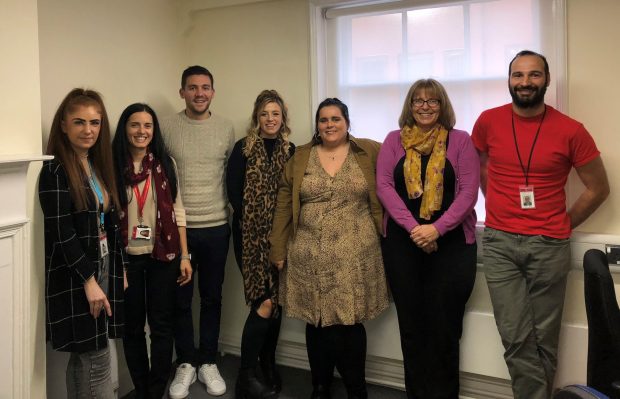Loredana Grigore is Team Leader for the Divisional-Based Intervention Team (D-BIT). Part of Essex County Council's Children and Families unit.
Shortlisted for the 2019 Social Worker of the Year - Team Leader of the Year for Children's Services award and nominated by Luke Goldie-McSorley, a Practice Supervisor within her team. She's affectionately known as ‘Boss’. "Not because of her wielding of power or status... but because of the immense respect and gratitude that everyone has for her..."
Here Loredana shares what it feels like to be a nominee. And why she believes in treating her team like her very own clients.

When your work is appreciated
The nomination for Team Leader of the Year by my own team is wonderful. It’s very reassuring to know that what I’m striving to achieve is being well received and recognised.
I've worked in Romania, Canada and the UK as a social worker, and have learnt to adapt to the varying social care systems. To be curious about the nature of the role and about the people I work with. I enjoy meeting new people and learning about new cultures. Integrating into teams whilst still maintaining my independence. And bringing some of my own way of working.
When I started as the D-BIT Team Manager, the team was a total of 2 colleagues. I was able to recruit new staff and develop a team around the practice of solution-focused work. A different language and way of thinking, it's a structured conversational approach built on a set of assumptions. Using questions at its heart to support change. We use this approach in our work with families, but also with each other to develop as professionals and as a team.
I strive to treat each team member as my own client. I focus on enabling and empowering them as practitioners. It’s important to support social workers before supporting children and families. How can social workers deliver effective practice if they don’t feel supported? And confident in themselves!
Leading by example
Part of my role as Team Leader is to ensure staff continue their learning and development. I’ve tried to create a working environment where staff feel they can flourish and thrive. Whilst at the same time feeling supported to learn and improve.
My gut reaction to the National Assessment and Accreditation System (NAAS) was ‘Oh god what is this?’ 'Why do we have to do it?’ But on reflection, I’d not really understood the purpose.
Other professions, such as medical practitioners, go through a similar process. And regularly. It’s only natural social work should follow a similar assessment of the quality of practice.
Staff need to know they are on the right track when it comes to effective practice. How else do we grow as individuals and as a team if we are not constantly learning and developing?
As a team leader, I felt it important I set an example to my team. They would be looking to me for guidance and how best to approach the assessment. If I was going to talk them through the importance of accreditation, I needed to do it.
I completed NAAS in April 2019. I found once I’d taken it and shared my experience, others also showed interest. I’m incredibly lucky to work with such open-minded, fearless people, curious to know more about it.
I’m happy to say a social worker in my team has taken the assessment. He did it even before I did. And several others are now preparing to take it in 2020.
It’s okay to make mistakes
Below is a list of my key takeaways from NAAS.
- The assessment is not like a test at school or university. You’re not learning from scratch. It’s about demonstrating your existing level of skill and knowledge.
- If you achieve ‘met’ status. Great. If you’re ‘not met’, try to see it as 'not met yet'. It's a chance for you to work with your employer to develop a more targeted learning and development plan.
- Recognise that you’re human. You make mistakes in your day to day work. The assessment is no different. If you get something wrong, learn from it.
- The role-play scenarios (simulated assessment) are no different from those faced in your daily work. You never really know the circumstances of a child or family situation until you meet with them.
- It’s important to recognise your own value and what you’re good at. NAAS is a great feedback tool. It offers reassurance that you’re delivering quality practice.
The Social Worker of the Year awards 2019 took place on Friday 29 November 2019. For further information about the awards, including award nominees, visit Social Work Awards.
Leave a comment